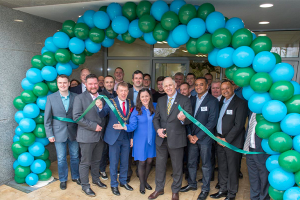VMware Faces Uphill Fight in VDI Marketplace
![]() VMware is an incredible company that has grown from nothing in the last decade to be a driving force in the revolution that is sweeping through IT. And Pat Gelsinger, who took over as CEO last year, is a true visionary who has made dramatic changes that have on the whole made VMware stronger. The company’s growth record over the last year, this week’s hugely successful VMworld 2013, and most important, its vision of the Software-Defined Data Center, are all evidence of that.
VMware is an incredible company that has grown from nothing in the last decade to be a driving force in the revolution that is sweeping through IT. And Pat Gelsinger, who took over as CEO last year, is a true visionary who has made dramatic changes that have on the whole made VMware stronger. The company’s growth record over the last year, this week’s hugely successful VMworld 2013, and most important, its vision of the Software-Defined Data Center, are all evidence of that.
A major part of that vision is VDI. When Gelsinger streamlined the company, shuttering some operations and spinning others out into what became Pivotal, he refocused the company on three areas: Hybrid Cloud, the Software-Defined Data Center, and VDI. He backed that by creating a major VDI division, hiring Sanjay Poonen away from SAP to lead it, and hiring a dedicated sales force to support it.
However, VMware faces a major uphill struggle making a dent in the rapidly moving VDI market, and Poonen’s prediction on theCUBE that in a year VDI will provide a major part of VMware’s growth, is at best optimistic. First, VMware’s major competition in this market is not, as Poonen said, Citrix. It is Microsoft Hyper-V. And that is a huge problem for VMware. One of the biggest headaches associated with VDI is software licensing. The desktop model of licensing by machine or user is impossible to administer in an environment where the software runs on a server and is delivered as a cloud service to employees who may switch among a laptop, smartphone, and tablet at unpredictable moments and consume those services not just at their desks but at home, in restaurants, on airplanes, etc. But it is what we are stuck with.
And of course much of the core software, starting with Windows and Office, is from Microsoft. So what happens when the Microsoft rep tells the CIO that if he uses Hyper-V for VDI and has each employee properly licensed then he is okay to go, but if he chooses another hypervisor Microsoft will have to audit his VDI environment probably annually? And Hyper-V is a perfectly good hypervisor for VDI that Microsoft is investing heavily in and that comes for free. How does VMware compete with that?
Second, Poonen was also incorrect in characterizing VDI as a two-horse race. Several companies, including major colocators who have their own strong connections with many CIOs, are offering VDI-as-a-Service. These services are attractive because they remove all the headaches of creating and running a major infrastructure, licensing, etc., and they can be implemented immediately and paid for from operating funds, saving CapEx. In other words, the same things that made Salesforce so attractive to senior operational management. This is actually the main competition to Microsoft.
So how can VMware compete in this market? By taking a page from both books. Support for hybrid cloud is another of the three main focal points of VMware’s strategy. It should make VDI the first use case of its hybrid cloud service. Offer it as-a-service, providing all the advantages of that approach, but with full integration into corporate VMware private clouds, so that the VDI data is fully available to internal systems-of-record.
Will this strategy guarantee that VMware dominates VDI the way it does serve virtualization? No. Certainly the other competitors in this market can and probably are adopting similar strategies. It does allow VMware to bring its strengths to the table and probably win a slice of the market. But it has to get up to speed immediately, and it cannot take this market for granted.
A message from John Furrier, co-founder of SiliconANGLE:
Your vote of support is important to us and it helps us keep the content FREE.
One click below supports our mission to provide free, deep, and relevant content.
Join our community on YouTube
Join the community that includes more than 15,000 #CubeAlumni experts, including Amazon.com CEO Andy Jassy, Dell Technologies founder and CEO Michael Dell, Intel CEO Pat Gelsinger, and many more luminaries and experts.
THANK YOU











